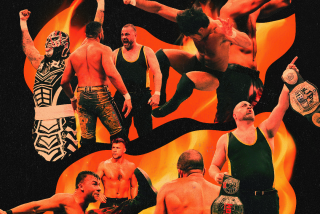Cejudo is ready to conquer the world
- Share via
RIO DE JANEIRO — Andy Moreno had his American opponent right where he wanted him: out of position and seemingly out of luck. But when Moreno moved in for the kill only 10 seconds from victory, Henry Cejudo stunned the Cuban wrestler by flipping him on his back.
“Pretty incredible,” said Kevin Jackson, coach of the U.S. wrestling team. “He was down twice and dug down deep to come back.”
But that match at May’s Pan American Championships, where he won the gold medal at 121 pounds, wasn’t the first time Cejudo has succeeded despite long odds. In fact, that has been his life story.
“When I’m down, I’m dangerous,” he said. “I just don’t give up no matter what I’m doing. If I put my mind to it, there’s nobody that’s going to stop me.”
Moreno may get another chance to do just that next week when the freestyle wrestling competition begins at the Pan American Games. But it may not matter much. Cejudo, 20, has already put U.S. wrestling on its ear, winning two national championships before his 21st birthday. And now he’s taking on the world.
In the last year, he has medaled in tournaments in Iran and Russia and if he follows his win over Moreno with another victory here, it will give him a big boost entering the world championships in September in Azerbaijan.
Regardless of where he is on the mat, however, Cejudo’s mind is never far from home. And it’s those memories of a difficult childhood and a dedicated single mother who worked two jobs to keep food on the table that provided the motivation to turn Cejudo into the youngest national champion in decades and, according to Jackson, the future of U.S. wrestling.
Born in Los Angeles to undocumented Mexican immigrants who separated when he was 4, Cejudo spent much of his young life on the move, going from California to New Mexico, on to Arizona and finally to Colorado. The family often stayed in the same place only days or weeks at a time while sleeping four to a bed.
For Cejudo and his five siblings, Christmas was no more than another date on the calendar.
“I think I only asked once for Christmas [presents],” said Cejudo who, in elementary school, told his mom he wanted skates.
“I got the skates, but they were the wrong size,” he said. “After that, I never asked [again]. We understood since Day 1. She’s single. She’s working hard. We all had to suck it up. Big deal, we don’t get toys.”
What Cejudo did treasure, however, were the rare moments with his mother Nelly Rico.
“She worked at everything you can think of. Factory, labor,” Cejudo said. “The few hours I’d see her I’d just cherish. After school I used to just run home because I knew she’d be gone [soon].”
As a teenager Rico had come to Los Angeles, along with a cousin and a sister, looking for a better life than the one she knew in Mexico City. She eventually met another immigrant from Mexico City, Jorge Cejudo, with whom she had four children.
But Jorge, plagued -- his son says -- by drug and alcohol addictions, was constantly in and out of prison. So Rico packed up her children and again hit the road in search of a better life. Henry never again saw his father, who died of heart failure in Mexico City three months ago at the age of 44.
It was a tough way to grow up, Cejudo acknowledges. But without those experiences, he also concedes, he wouldn’t be the wrestler he has become.
“Just attitude,” he said. “I grew up with a kind of tough love. Because I was one of the youngest ... I always had to fight for something. That matured me a little bit. It actually takes me through both [practice and matches]. Just knowing the stuff that we’ve gone through.
“I just never give up.”
U.S. assistant coach Terry Brands, a two-time world champion and Olympic bronze medalist, agrees Cejudo has uncommon maturity -- as well as an uncommon work ethic -- for a wrestler his age. He credits Rico for each trait.
“His mother was a great supporter of all the family,” he said. “She’s done an extremely good job of being able to support those kids and teaching them the value of doing your best all the time. He’s going to win regardless of what background he came from. God’s instilled an unbelievable, indomitable will in him. He finds a way to win when most people think he can’t get the job done.”
Just ask Andy Moreno.
--
More to Read
Go beyond the scoreboard
Get the latest on L.A.'s teams in the daily Sports Report newsletter.
You may occasionally receive promotional content from the Los Angeles Times.











